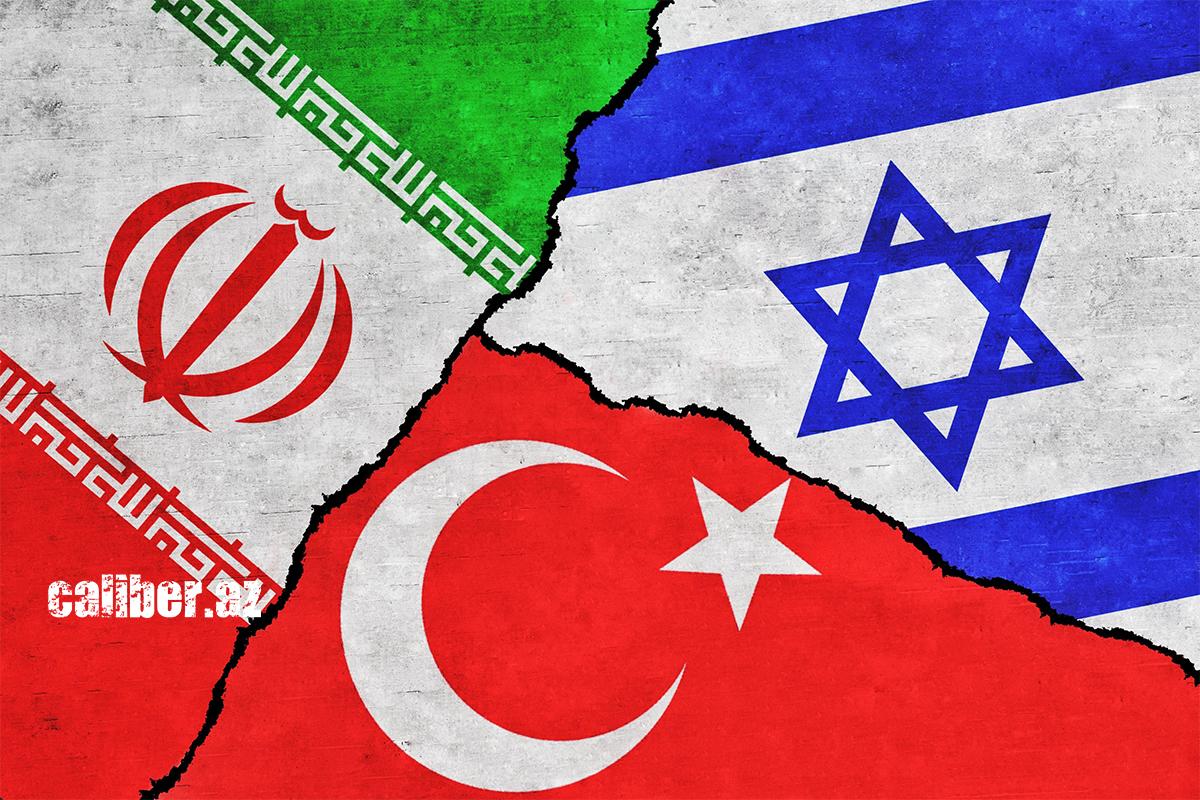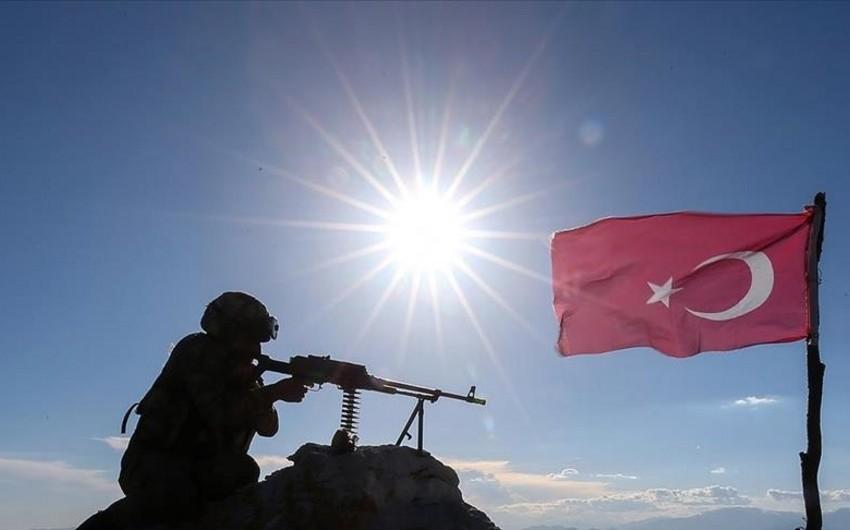Iran loses influence as Türkiye and Israel strengthen positions in Syria The fracture of the “Axis of Resistance”
Tehran once wielded considerable influence over what appeared to be a powerful force: the "Axis of Resistance" — a coalition of predominantly (though not exclusively) Shiite armed militias and political factions loyal to Iran. This alliance included Palestinian Hamas and Islamic Jihad, Lebanon's Hezbollah, the Assad regime and pro-Iranian militias in Syria, Iraq's Popular Mobilization Forces (PMF), which exert dominant influence over Baghdad's politics, and Yemen's Houthis. Today, the "Axis of Resistance" is broken.
Israel, Türkiye, and the Syrian armed opposition have eliminated the central link of the "Axis of Resistance"—Syria, or more precisely, the regime of Bashar al-Assad that governed it. The integrity of the "Axis of Resistance" has been disrupted, cutting off the land connection between Lebanon and Iran. The Shiite crescent stretching from Tehran to Beirut has been significantly weakened.
Russia, which relied on Assad and provided him with military support alongside Iran and Hezbollah, has also lost influence in Syria. Now, other countries—primarily Türkiye and, to some extent, Israel—have gained leverage over developments in Syria. The fate of the country now rests in the hands of these two powers. It is reasonable to assume that they will seek to carve out spheres of influence in Syria.

Following a swift 11-day march on Damascus, pro-Turkish forces and their allies now control a vast portion of Syria, including the capital, Damascus. However, these forces are highly diverse.
Hayat Tahrir al-Sham (HTS), prior to its offensive, was based in the Idlib region. There, it managed to build a modern 20,000-strong army, overseen by a central command while maintaining highly autonomous units. A local military academy trained commanders and fighters for several years, equipping them with skills such as drone warfare.
HTS received funding from certain Gulf countries, but its rearmament in a region wedged between Assad and Türkiye would have been impossible without Ankara's support. While HTS maintains ties with Türkiye, it is still capable of acting independently.
Another influential faction within the armed opposition that defeated Assad, the Syrian National Army (SNA), is entirely funded and armed by Türkiye and operates under the command of Turkish officers. A recent Reuters report revealed that Ankara was informed about preparations for the offensive against Bashar al-Assad's regime six months in advance. Analysts note that opposition groups could not have acted without first notifying Türkiye, which has been the primary supporter of the Syrian opposition since the early days of the war.
According to sources—a regional diplomat and a member of the Syrian opposition—the offensive was closely coordinated with Türkiye. Hadi al-Bahra, head of the internationally recognized Syrian opposition abroad, told Reuters last week that HTS and the SNA engaged in "limited" joint planning before the operation and agreed to "cooperate and avoid conflict with each other." He added that Turkish military officials were aware of and observed the activities and discussions of the armed groups.
Türkiye’s Foreign Minister Hakan Fidan, speaking in Doha, Qatar, on December 8, stated that President Erdoğan's recent efforts to establish contact with Assad had failed, adding that Türkiye "knew something was coming."
Fidan’s remarks require clarification. Türkiye had sought to negotiate with Assad on normalizing relations and facilitating the return of four million Syrian refugees. However, this plan fell through, leaving Ankara with motives to support the opposition's offensive as a means to pressure Bashar al-Assad, who was then still the president of Syria. Nevertheless, no one anticipated that Assad’s fall would occur so swiftly.
In addition to the two aforementioned groups, other armed factions operate in Syria, including the Free Syrian Army (FSA), whose units were active in the south, Druze militias, and several others. However, these groups are significantly outmatched by the SNA and, especially, HTS in terms of numbers, armament, and combat training.
Overall, it can be said that Türkiye holds substantial influence over the forces that now control the majority of Syria.

Meanwhile, Türkiye has diverse interests in Syria. First and foremost, Ankara aims to push Kurdish forces away from its borders. These units are led by cadres of the PKK (Kurdistan Workers' Party), which has been engaged in an armed struggle against Türkiye since the mid-1980s. The establishment of a PKK-controlled enclave along the Syrian-Turkish border is considered unacceptable by President Erdoğan and his administration. Currently, the Kurdish autonomous administration controls approximately 40 percent of Syrian territory, including several border areas. As a result, Ankara insists on creating a 25-30 km deep "safe zone" along the entire 800-kilometer border with Syria. There is no doubt that Türkiye will continue its efforts to expel Kurdish forces from these regions.
Standing in the way of Türkiye's plans, however, are the United States. American forces have established military bases in Kurdish-controlled territories and have not permitted the Turkish army to launch anti-Kurdish operations. However, it is possible that Donald Trump, recently elected president, may include a U.S. troop withdrawal from Syria in his plans. This would pave the way for Türkiye’s ambitions to become a reality. It is likely that both the SNA and HTS will play a role in supporting Türkiye's plan.
If the leader of HTS, Abu Muhammad al-Julani, were to take control of Syria—a possibility, though not a certainty—he would likely aim to extend his authority over the entire country. It is doubtful he would allow the PKK-affiliated Kurds to retain control over 40 percent of Syria, including its oil fields and agricultural heartland (notably wheat production). It is highly likely that Türkiye would offer him financial and military support in exchange for agreeing to a large-scale anti-Kurdish operation, as the interests of both sides align in this regard. However, this scenario would depend on the withdrawal of U.S. forces from Syria.
Türkiye’s other objective revolves around asserting influence up to the Aleppo-Mosul line. These two major cities in Syria and Iraq, along with the territory between them, are viewed by the Turkish leadership as a special zone of Turkish influence. Türkiye would likely propose investments in Aleppo and assistance in rebuilding the war-torn city in exchange for influence over the political and administrative processes occurring there.
Finally, Türkiye is keen on the return of millions of Syrian refugees to their homeland. Their presence on Turkish soil has caused frustration among parts of the local population. Turkish businessmen complain about competition from Syrians, while some workers feel their wages are being undercut as refugees accept any job. The opposition has exploited these sentiments against Erdoğan. Therefore, the Turkish leadership is invested in facilitating the refugees' return home. This was impossible under Assad, who viewed their return as undesirable due to their perceived disloyalty, but it has now become a feasible objective.
Additionally, with Turkish forces stationed in northern Syria, there is a strong likelihood that Türkiye will seek to strengthen its influence in a post-Assad Syria.

On the other hand, the armed groups that defeated Assad are not united. There is a high probability that, at some point, internal conflict will arise between them. Here, once again, much will depend on Ankara's position. If Türkiye can use its influence to mediate between the factions and build a political structure favorable to its interests, it will secure significant influence over Syria's future.
On the other hand, reports indicate that the Israeli army is advancing from the south, capturing small areas near the Israeli-annexed Golan Heights. Similar to Türkiye, Israel is also discussing the establishment of a security zone along its border. Previously, Israeli officials made statements suggesting that they are dissatisfied with Assad's regime, as it is an ally of Iran and a supporter of the Lebanese Hezbollah, with whom Israel has fought wars. By significantly weakening Hezbollah, whose forces were a key support base for Assad’s regime in the Aleppo area, Israel has provided substantial assistance to the forces advancing against Assad, including HTS and the SNA.
It is unclear whether Israel has formed any alliances with opposition Syrian armed groups or with Türkiye at present. However, in the past, Israel provided its hospitals to treat wounded HTS fighters. In any case, removing Syria from the pro-Iranian "Axis of Resistance" coalition and halting the supply of weapons to Hezbollah via Syrian territory align with Israel’s strategic interests.
However, Israel may have other interests in Syria as well. The Druze area of Suwayda in the southern part of the country is concerned about the rise of Sunni Islamist groups like HTS. The Israeli leadership, which maintains close ties with the Druze in its own territory, might leverage its connections with Druze communities and simultaneously with HTS to mediate and resolve the complexities of this issue.
Overall, it can be concluded that Iran has lost all influence in Syria, while Israel and, particularly, Türkiye have strengthened their positions there.
"Türkiye is the biggest winner. Erdoğan has found himself on the right—or at least the winning—side of history, because his proxies in Syria have triumphed," noted Turkish political scientist Birol Baskan.








